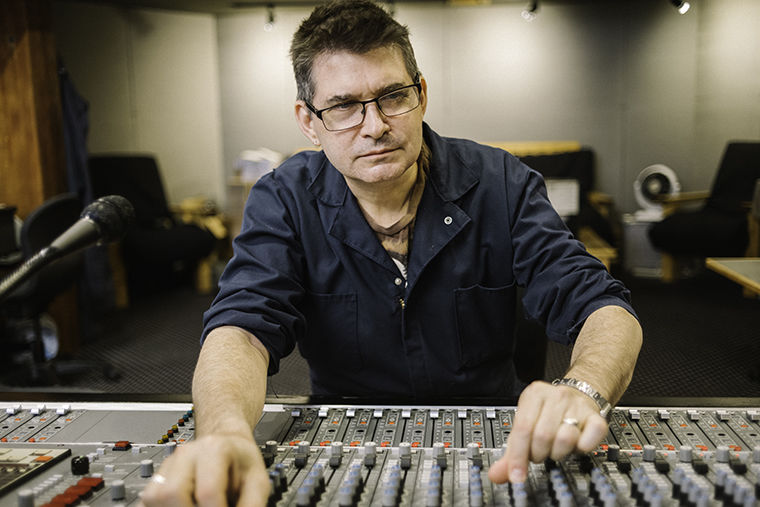Pioneer of Punk: Steve Albini remembers music community
Producer and musician Steve Albini (bottom) knows the ins and outs of Chicago’s punk scene. He has seen it grow throughout the decades and still lives it, recording punk bands at his Avondale recording studio Electrical Audio, 2621 W. Belmont Ave.
April 10, 2017
Punk rock was a single, momentary flash of light, casting shadows on those who preceded it. Changing the lives of many, punk rock was a movement that influenced art, fashion and culture for years, and artist Steve Albini was among those who saw that spark.
Member-of-band-Big Black-turned-music journalist, Albini, 54, has been involved in the Chicago punk scene since moving to the city in 1980. He now runs the recording studio Electrical Audio, 2621 W. Belmont Ave. in Avondale, and works with bands from across the country.
Albini said he challenges what it means to be a musician in today’s consumer-centered society and cherishes punk for its anti-establishment mindset and diversity.
“[The Chicago punk scene was for] freaks and f–k-ups and people who could not function in the outside world,” Albini said, reflecting on nearly 40 years in the industry. “All my friends had trouble holding a job; they would run in with the law and would go on drug binges.”
Growing up in Missoula, Montana, Albini came to Chicago to study journalism at Northwestern University. While he had been involved with bands back home, he became immediately immersed in the Chicago underground music scene. After seeing a couple of shows, Albini tried to get a few bands together—eventually rounding up members to form Big Black.
Jim DeRogatis, music critic, co-host of WBEZ’s “Sound Opinions” and senior lecturer in the English Department, said Big Black was one of the most important bands in the ‘80s, both musically and lyrically. Albini provides a journalistic quality to his music, covering topics such as the meat-packing industry and cow slaughtering in Chicago in the song “Cables.”
“Albini [chronicles] certain aspects of life that were very interesting, and the harshness of those lyrical portraits are matched by the aggression of the music,” DeRogatis said.
What he found significant, specifically in the Chicago punk scene, was the sense of community. In the ‘80s, Los Angeles and New York City had prominent people in the scene who were seen as “head figures.” In Chicago, there were half a dozen bands that were at their peak and equally influential in the ‘80s, he added.
“There was no ‘Pope of Punk’ in Chicago,” Albini said. “That lack of authority has been a pretty constant signifier of Chicago.”
Albini said Chicago bands were more passionate about the music itself than the industry. He and his band would go against the grain, straying away from playing commercial venues or having a publicist.
“As punk rock became influential culturally, normal people got involved with it and embraced it, becoming the dominant identity of the underground music scene,” Albini said. “I did feel that difference, so my bands and I try to break out of that thing.”
One of the bands he has recorded at his studio is Screaming Females, a punk band from New Jersey. He said he works with the group because of how inspirational the members’ passion is.
“[Albini’s] not afraid to work, and he’s not only recording bands that are cool and hip at the moment, he records bands that are committed,” said Screaming Females vocalist Marissa Paternoster.
Albini said he has never pretended he could make a living being in a band, even though he has been making records for most of his life. Now, this recording studio is what keeps him afloat, he added.
“If I tried to make [my band] my profession, I would have hated it by now,” he said. “But because it is actually a release valve for me and when I get bummed out about other stuff in my life, I know at least my band is ours.”
Click here for the full photo gallery by Photo Editor Kevin Tiongson








